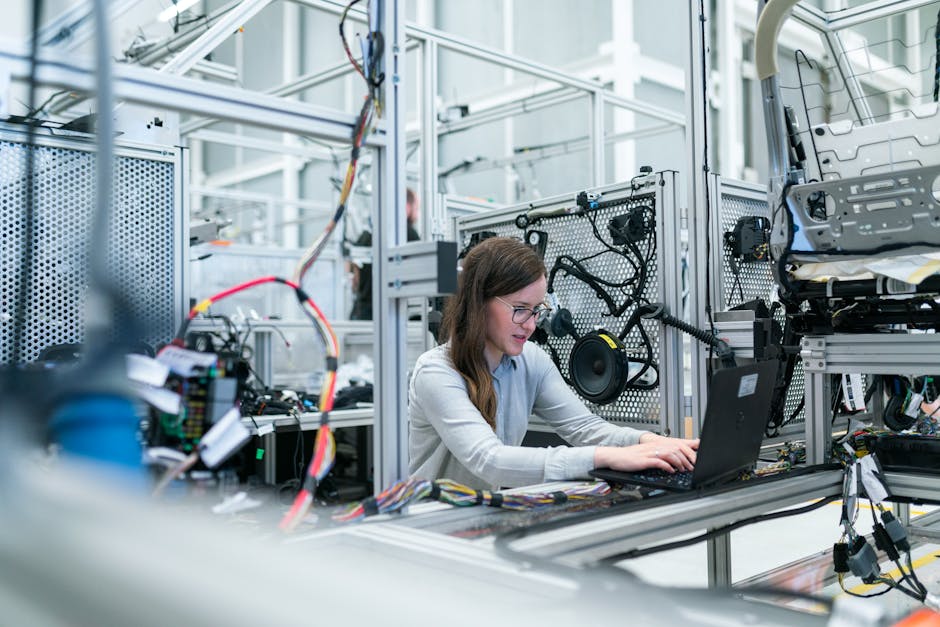Driving Innovation In Leeds’ Education Sector Using Bespoke Software
Imagine a world where education is not limited by traditional methods, but instead propelled forward by cutting-edge technology. Picture a classroom where teachers have access to personalised software that enhances their teaching methods and students are empowered with innovative tools for learning.
In Leeds’ education sector, this vision is becoming a reality through the use of bespoke software.
Driving innovation in education means streamlining administrative processes, enhancing teaching and learning methods, personalising student experiences, improving communication and collaboration, and tracking and analysing student performance.
With bespoke software solutions tailored specifically to the needs of Leeds’ educational institutions, educators can embrace these advancements and transform the way they teach and engage with their students.
From automated administrative tasks that free up valuable time to interactive virtual classrooms that foster creativity and critical thinking skills, bespoke software is revolutionising the education landscape in Leeds.
By adapting to technological advancements and harnessing the power of modern technology, educators are paving the way for a more efficient, effective, and engaging learning experience for all.
Key Takeaways
- Bespoke software streamlines administrative processes and reduces paperwork in educational institutions in Leeds.
- Gamification and blended learning methods enhance teaching and learning in Leeds.
- Personalised learning tailors the curriculum to meet the specific needs and interests of each student.
- Technological advancements, such as virtual reality integration, drive innovation and prepare students for the digital future.
Streamlining Administrative Processes

You can easily simplify and expedite administrative tasks by utilising our custom software solutions. With our innovative approach to automating workflows and reducing paperwork, we aim to revolutionise the education sector in Leeds.
Our bespoke software is designed specifically for educational institutions, providing them with a powerful tool to streamline their administrative processes. By automating workflows, our software eliminates the need for manual data entry and repetitive tasks. This not only saves time but also reduces human error, ensuring accuracy and efficiency in all administrative operations. Whether it’s managing student records, generating reports, or handling financial transactions, our software handles it all seamlessly.
In addition to automating workflows, our software also simplifies document management by reducing paperwork. Say goodby to stacks of forms and endless filing cabinets – our digital solution allows you to store and access documents electronically. This not only saves physical space but also makes information retrieval quick and easy.
Our forward-thinking approach ensures that we stay ahead of the curve when it comes to advancements in technology. We constantly update and improve our software to meet the evolving needs of educational institutions in Leeds.
As we transition into discussing how our custom software enhances teaching and learning methods without missing a beat, you’ll see how seamlessly everything ties together.
Enhancing Teaching and Learning Methods

By incorporating custom software solutions, educators in Leeds are revolutionising teaching and learning methods to create a more engaging and effective educational experience. Utilising gamification in the classroom and implementing blended learning approaches are two innovative ways that educators are enhancing teaching and learning methods.
Gamification is all about making learning fun and interactive by incorporating game elements into the classroom. This approach not only captures students’ attention but also motivates them to actively participate in their own education. By introducing gamified activities such as quizzes, competitions, and rewards systems, educators can transform mundane lessons into exciting challenges that encourage active learning.
Blended learning takes advantage of technology to combine traditional face-to-face instruction with online resources. This approach allows students to access educational materials at their own pace outside of the classroom while still benefiting from direct interaction with teachers during class time. It promotes self-directed learning, collaboration, and critical thinking skills. With bespoke software solutions, educators can seamlessly integrate online platforms into their curriculum, providing students with a personalised learning experience tailored to their individual needs.
In order to engage the audience further, let’s take a look at how these innovative teaching methods translate into tangible benefits for students:
| Benefits | Gamification | Blended Learning |
|---|---|---|
| Increased Motivation | Engages students through game-like experiences | Offers flexibility and autonomy |
| Active Participation | Encourages students to actively participate in their own education | Promotes collaboration and critical thinking |
| Personalised Learning | Tailors content based on individual progress | Allows for self-paced studying |
By leveraging custom software solutions in Leeds’ education sector, educators are transforming traditional teaching methods into dynamic experiences that foster student engagement and success. Next up: personalising student experiences without missing a beat!
Personalising Student Experiences

Implementing personalised learning techniques in the classroom is like creating a tailor-made suit for each student, ensuring that their unique needs and interests are met. In today’s fast-paced world, where technology is advancing at an unprecedented rate, it’s crucial to adapt teaching methods to provide students with a truly customised curriculum.
-
Customised curriculum: Personalised learning allows educators to tailor the curriculum to meet the specific needs and interests of each student. By using bespoke software, teachers can create individualised lesson plans that cater to different learning styles and abilities. This approach not only enhances student engagement but also fosters a deeper understanding of the subject matter.
-
Individualised assessments: Gone are the days of one-size-fits-all exams. With personalised learning, assessments are designed to reflect each student’s progress and achievements accurately. Through data-driven insights provided by innovative software solutions, teachers can identify areas where students excel or struggle. This information enables them to adjust their teaching strategies accordingly and provide targeted support when needed.
-
Empowering students: Personalised learning empowers students by giving them more control over their educational journey. Students have the flexibility to explore topics they find interesting while still meeting academic requirements. They can set goals based on their own aspirations and work towards achieving them at their own pace. This approach nurtures a sense of ownership and responsibility for their education.
By personalising student experiences through customised curricula and individualised assessments, we can drive innovation in Leeds’ education sector. However, enhancing teaching methods is just one step towards transforming education as a whole. The next section will explore how improving communication and collaboration amongst students and teachers further enhances the learning experience.
Improving Communication and Collaboration

Enhancing communication and collaboration amongst students and teachers fosters a more dynamic and interactive learning environment. In today’s digital age, the use of various digital tools has revolutionised the way education is delivered. These tools provide innovative ways for students to communicate and collaborate with their peers and teachers.
Digital tools such as online discussion forums, video conferencing platforms, and collaborative document editing software enable students to connect with each other regardless of their physical location. This allows for greater flexibility in scheduling group projects or study sessions. Moreover, these tools encourage active participation from all students, facilitating a more inclusive classroom environment.
Another crucial aspect of communication and collaboration is parent involvement. By utilising digital platforms that facilitate parent-teacher communication, such as dedicated parent portals or messaging apps, parents can stay updated on their child’s progress and actively engage in their educational journey. This level of transparency encourages parents to become more involved in their child’s education, leading to better outcomes for the student.
Improving communication and collaboration through these digital tools not only enhances the learning experience but also prepares students for the demands of our increasingly connected world. By fostering effective communication skills early on, we’re equipping our future workforce with essential abilities needed for success.
As we transition into the subsequent section about tracking and analysing student performance, it becomes evident how improved communication and collaboration contribute to this process. By using digital tools to track assignments, grades, and attendance records, educators can gain valuable insights into student performance trends. This data-driven approach enables them to identify areas where individual students may need additional support or where teaching methods could be adjusted for better results.
Tracking and Analysing Student Performance

One exciting aspect of tracking and analysing student performance is the ability to uncover valuable insights that can help personalise their learning journey. By utilising data driven interventions and predictive analytics, educators in Leeds can gain a deeper understanding of each student’s strengths, weaknesses, and individual needs. This allows for targeted support and tailored instruction that maximises learning outcomes.
Tracking and analysing student performance goes beyond simply monitoring grades or test scores. It involves collecting a wide range of data points such as attendance records, engagement levels, and even social-emotional indicators. This comprehensive approach provides a holistic view of each student’s progress and well-being.
By using bespoke software specifically designed for tracking and analysing student performance, educators in Leeds have the tools they need to identify patterns, trends, and areas of improvement. For example, through predictive analytics algorithms, teachers can predict which students are at risk of falling behind or struggling with certain concepts. This enables proactive intervention strategies to be implemented before it’s too late.
To emphasise the importance of this process, consider the following table:
| Key Benefits | Examples |
|---|---|
| Personalised Learning | Individualised lesson plans based on specific needs |
| Early Intervention | Identifying struggling students early on for targeted support |
| Continuous Improvement | Tracking progress over time to inform instructional adjustments |
This data-driven approach not only benefits individual students but also contributes to overall educational advancement in Leeds by identifying systemic challenges or gaps in curriculum effectiveness.
As technology continues to advance at a rapid pace, adapting to these advancements becomes crucial for driving innovation in education. The next section will explore how embracing new technologies can further enhance the learning experience for students in Leeds without losing sight of traditional teaching methods.’
Adapting to Technological Advancements

Now that you have a better understanding of how tracking and analysing student performance can drive innovation in the education sector, let’s dive into the next exciting subtopic: adapting to technological advancements.
In today’s fast-paced world, it’s crucial for educational institutions in Leeds to keep up with the latest technological developments to provide students with a cutting-edge learning experience.
To stay ahead of the curve, schools and universities are increasingly turning towards bespoke software solutions that automate assessments and integrate virtual reality (VR) into their curriculum. This innovative approach not only enhances the learning process but also prepares students for the digital future they’ll face.
Imagine a classroom where traditional exams are replaced by interactive VR simulations that allow students to apply their knowledge in real-world scenarios. Picture them exploring ancient civilisations or conducting chemistry experiments without any physical limitations. The integration of VR technology opens up endless possibilities for immersive and engaging learning experiences.
Moreover, automating assessments through bespoke software streamlines the evaluation process, saving time for both teachers and students. With automated grading systems, educators can receive instant feedback on student performance, enabling them to identify areas where additional support may be required promptly.
By embracing these technological advancements and harnessing the power of bespoke software solutions, Leeds’ education sector can truly drive innovation forward. It’s an exciting time for educators as they pave the way for a future where teaching and learning are transformed through automation and virtual reality integration.
Contact us to discuss our services now!
